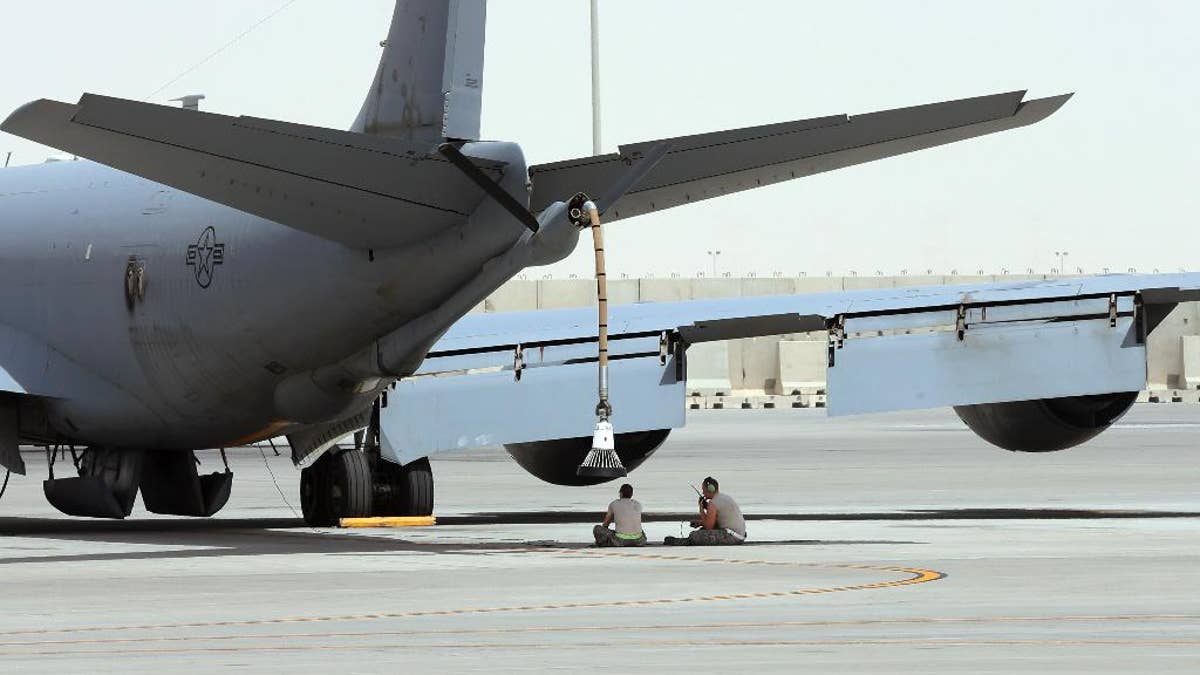
FILE -- In this photo taken Monday, March 9, 2015, U.S. technicians sit under the KC-135 refueling aircraft at the al-Udeid Air Base in Doha, Qatar. (AP Photo/Osama Faisal)
It’s time to end the Washington myth that the United States must tread carefully in confronting Qatar over its support for Iran, Hamas and radical Islamic groups in order to avoid losing access to a strategic U.S. air base.
As someone who helped establish U.S. air operations in Qatar in 2001, I can say two things with great confidence: the U.S. military can leave Qatar just as quickly and painlessly as it arrived; and Qatar needs America far more than America needs Qatar.
Less than 48 hours after the planes hit the World Trade Center and the Pentagon on Sept. 11, 2001, I landed in Qatar to establish a new air operations hub at Al-Udeid Air Base, just outside Doha, to support the coming war in Afghanistan. The Qataris had built Al-Udeid in the 1990s as an immaculate, albeit terribly oversized, base for their own air force.
With a few temporary hangars and a steady supply of fuel, we had what we needed to initiate round-the-clock air combat operations in less than a week.
Within 18 months, as the U.S. ramped up for war in Iraq, the Pentagon poured in military construction dollars to relocate its Coalition Air Operations Center from Prince Sultan Air Base in Saudi Arabia to Al-Udeid and stand up a forward headquarters for U.S. Central Command.
Al-Udeid transformed nearly overnight to become the nerve center of two major wars. From a Defense Department perspective, it wasn’t hard to do and wasn’t particularly expensive – and if we could do it once, we can surely do it again.
Today, as policymakers in the Trump administration and Congress become increasingly alarmed by Qatar’s schizophrenic foreign policy, some have forgotten how we arrived at Al-Udeid. They fear that by pressuring Qatar, we could lose a supposedly indispensable national security asset. But history reminds us that nothing could be farther from the truth.
Al-Udeid is not critical to U.S. national security. The base is a matter of convenience in a region with many other options of equal convenience. The U.S. could expand its footprint at Al-Dhafra Air Base in the United Arab Emirates or could even return to Prince Sultan Air Base in Saudi Arabia. In addition, the Pentagon budget contains $143 million for upgrades to a strategic air base in Jordan.
The U.S. didn’t build Al-Udeid. We merely invested additional infrastructure in an existing Qatari base. That investment does not justify turning a blind eye to a host nation that aligns with Iran, Hamas, Sunni extremists in Syria and the Muslim Brotherhood – especially when alternative bases in the region are available.
Qatar has a long history of providing sanctuary to terrorist leaders, including Sept. 11 mastermind Khalid Sheikh Mohammed. In March 2014, a senior U.S. Treasury Department official called Qatar a “permissive jurisdiction” for illicit financing of terrorist groups in Syria, including ISIS and al-Nusra.
Since 2012, Qatar has hosted senior leaders of Hamas – a designated foreign terrorist organization – including terrorist masterminds responsible for the murder of Americans. Much of the tunnel infrastructure and missile technology that Hamas used in three wars with Israel in the past decade was funded and built with the help of Qatar.
The recent Central Intelligence Agency release of Osama bin Laden’s papers exposed how closely aligned Qatar has been with Iran for years. It’s clear that bin Laden saw Al Qaeda’s two key patrons as Qatar and Iran.
Qatar provided funds to Muslim Brotherhood affiliates whose interests bin Laden shared and also fomented radicalism through Al-Jazeera and Qatari-based and sponsored clerics, such as Yusuf al-Qaradawi. Iran funded many of the same Muslim Brotherhood affiliates and provided everything from training to logistical support – much as it did for Al Qaeda.
There is far more evidence, especially looking at Qatar’s real foreign policy – Al-Jazeera’s coverage – in proxy fights across the region.
In Bahrain in 2011, the “uprisings” enjoyed fawning coverage from Qatar’s famous news outlet. But Al Jazeera largely ignored the well-established Iranian influence behind those suspicious “protests.”
And consider what happened when the six Arab nations in the Gulf Cooperation Council and Egypt announced their blockade of Qatar this summer. Among the first foreign entities to condemn the action were Iran and the Iranian-funded, supplied and trained Houthi rebels of Yemen.
This is reminiscent of when North Korea was the only country to condemn the 2007 Israeli airstrike in Syria that took out a suspected North Korean-built nuclear facility.
The United States asks our allies to aggressively confront terrorism in all its forms and to deter Iranian expansionism and aggression. How can we continue to ask this of our allies if we turn a blind eye to Qatar?
We are arriving at an historic moment in the Middle East where alliances are shifting, historical conflicts are realigning and the future of the region is unknown. Alliances evolve throughout history and U.S. national security interests should direct this evolution. After all, what good is an alliance with a nation that isn’t actually an ally?
Qatar has a choice to make. It can choose to be a U.S. ally that confronts all terrorists and extremists and joins the U.S. in actually aligning on national security issues against Iran and its proxies – or it can continue a two-faced foreign policy.
Whatever path Qatar chooses, American policymakers need to remember that the U.S. has never been and never will be dependent on a military presence at Al-Udeid Air Base. We need to put Qatar’s rulers on notice that if they don’t shape up, we can easily ship out.








































